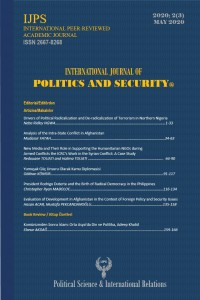Abstract
References
- Constantino, Renato. 1975. The Philippines: A Past Revisited. Manila: Tala Publications.
- Gaspar, Karl. 2018. “An Attempt at Dissecting the Presidency of Rodrigo Duterte.” In Social Ethics Society Journal of Applied Philosophy, Volume 4 (3): 1-30.
- Hotchcroft, Paul and Rocamora, Joel. 2003. “Strong Demands and Weak Institutions: The Origins and Evolution of Democratic Deficits in the Philippines.” Journal of East Asian Studies 3 (2): 259-292.
- Jaggar, Allyson. 2005. “What is Terrorism, why is it Wrong? And Could it ever be Morally Permissible?”. In Journal of Social Philosophy Volume 36, Number 2: 202-217.
- Mouffe, Chantal. 1995. “Liberalism and Modern Democracy.” in Democracy and Possessive Individualism. ed. Joseph Carens. New York: SUNY Press.
- Rafael, Vicente. 1988. Contracting Colonialism. Quezon City: Ateneo de Manila Press.
- Taylor, Graham. 2010. “The End of the Nation State: The Disarticulation of Power and Identity.” In The New Political Sociology. London: Palgrave Macmillan.
Abstract
Abstract: In this paper, I examine the radical approach to politics of President Rodrigo Duterte. I will trace the roots of this radicalism to the colonial history of the Philippines in which the Spanish colonizers instituted an elitist democracy system that engendered a deep social divide that has made the people of Mindanao felt betrayed by the capital. This politics of exclusion also gave rise to terrorism in the Southern Part of the country, the latest incident of which was the crisis in Marawi that has left the city devastated to the ground. Political analysts have always criticized the president’s War on Drugs as anti-poor. However, Duterte has remained prominent due to his radical means toward governance. Previous administrations have been accused as lacking any political will. Duterte, on the other hand, has symbolized the strong will of a leader who possesses the charisma necessary to institute real change. But while this is the view of many, this investigation argues that the country must strengthen its political institutions in order to truly mature as a democracy.
References
- Constantino, Renato. 1975. The Philippines: A Past Revisited. Manila: Tala Publications.
- Gaspar, Karl. 2018. “An Attempt at Dissecting the Presidency of Rodrigo Duterte.” In Social Ethics Society Journal of Applied Philosophy, Volume 4 (3): 1-30.
- Hotchcroft, Paul and Rocamora, Joel. 2003. “Strong Demands and Weak Institutions: The Origins and Evolution of Democratic Deficits in the Philippines.” Journal of East Asian Studies 3 (2): 259-292.
- Jaggar, Allyson. 2005. “What is Terrorism, why is it Wrong? And Could it ever be Morally Permissible?”. In Journal of Social Philosophy Volume 36, Number 2: 202-217.
- Mouffe, Chantal. 1995. “Liberalism and Modern Democracy.” in Democracy and Possessive Individualism. ed. Joseph Carens. New York: SUNY Press.
- Rafael, Vicente. 1988. Contracting Colonialism. Quezon City: Ateneo de Manila Press.
- Taylor, Graham. 2010. “The End of the Nation State: The Disarticulation of Power and Identity.” In The New Political Sociology. London: Palgrave Macmillan.
Details
| Primary Language | English |
|---|---|
| Subjects | Political Science |
| Journal Section | Articles |
| Authors | |
| Publication Date | May 13, 2020 |
| Submission Date | January 9, 2020 |
| Acceptance Date | May 7, 2020 |
| Published in Issue | Year 2020 Volume: 2 Issue: 3 |
Data Sharing Policy
This journal encourages authors to share the data obtained as a result of their research while remaining within the requirements of the universal and legal criteria for the protection of personal rights with scientific ethics and citation rules. In this context, IJPS adopts the Budapest Open Access Initiative Declaration (2001).

